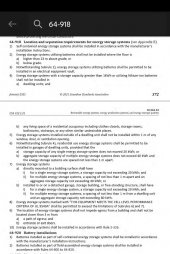Easier for them to control, they don't want all of that self-consumption and Independence BS eating into their profits.
Easy to think that, but requires ignoring the well-established bureaucratic regulation creation process which is orders of magnitude slower, by design, than technology evolution. Sure utilities are self-interested (as any capitalist would want them to be, but as a monopoly is supposed to be properly regulated by Utility Commission (or whatever local jurisdiction deems appropriate), which fails almost universally ... for political reasons on both side of political aisle, the net result being gross inefficiency ... for which both parties are equally to blame).
Beware wishing for fast changing regulations, as that most assuredly be its own nightmare
as much as I'd like regulations to be better written (ie not lumping all batteries in same category, as runaway thermal event risk varies significantly across chemistries), that really is expecting more than we typically get from people whose expertise is NOT batteries. in a few years (typical process update timeframe), I hope (possibly foolishly expect) clarification/improvement in building/electrical codes regarding type and capacity of in-home batteries. possibly around the time solid-state or other newer battery tech arrives, which could change safety considerations yet again.
ah, the joy of being on the cutting edge..
I do believe this is more a case of the old adage - Hanlon's razor that states: Never
attribute to
malice that which is adequately
explained by
stupidity. (by those writing the codes vs self-interest of the utility companies)
Then combine that with a real safety consideration (especially of low-cost, poorly implemented Li-Ion battery systems ... see scooter and e-bike fires in NYC as example) and hybrid inverters potentially putting electric grid line workers at risk. I'm all for balanced risk, so you won't see me advocate for no-risk solutions.. to me that is silly. But a 'do what i want, indulge my impatience, even if it puts others at significant risk' ... seems more worthy of electric shock 'therapy' than anything else
> It is fascism where laws are passed that industry wants to benefit that industry.
That statement represents a mis-understanding (or interpretation) of history, politics, and economics



